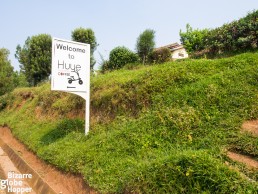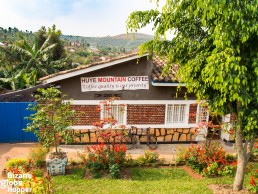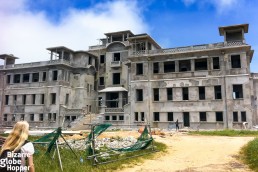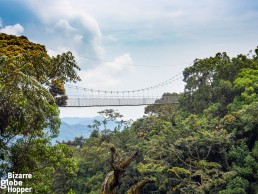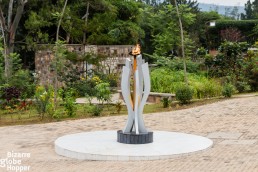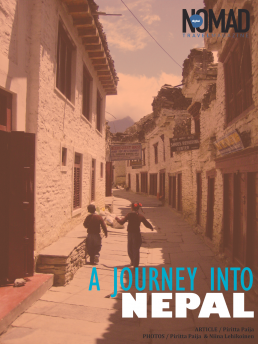Join us in search of the best Rwandan coffee beans – both in Rwanda and overseas! Get to know the history of Rwandan coffee trade, how to identify high-quality specialty coffee beans, and where to find and taste acclaimed high-altitude Rwandan coffee.
How We Ended Up Searching For Rwandan Coffee Farms
I fell in love with the distinctive red berry aromas of Rwandan coffee a month before our visit. The flavor profile of Rwandan coffee that I tasted in Finland was completely different from the other African coffees I had cupped before. That’s why I became obsessed with finding the best specialty coffee beans on our drive through the luscious, terraced hills of Southern Rwanda.
We had already toured Rwanda for a couple of days, traveling from Kigali to Kibuye on the shore of Lake Kivu, sailing through the idyllic landscapes to Cyangugu and crossing the epic Nyungwe Forest. I had been frantically googling where we could find the best specialty coffee beans on our route back to Kigali until I stumbled upon Huye Mountain Coffee.
With Huye Mountain Coffee, everything clicked. Their coffee farm is located straight by the Butare (also called Huye) – Kigali road, so we didn’t even have to make a detour. The coffee is labeled as ”high-altitude”, which is one of the primary criteria when you’re searching for high-quality coffee beans. When we left Nyungwe Forest after our canopy adventure, our tour guide called Huye Mountain Coffee to get a green light for our visit. I could hardly hide my excitement!
How to Find High-Quality Coffee Beans in Rwanda – And Overseas
This might already sound so snobbish that I have a confession to make. I’ve grown into an irritant coffee hacker after I switched back to coffee from green tea a couple of years ago. One reason is that my stomach can only tolerate high-quality beans since they have fewer pesticides, chemical fertilizers, and mold – all distressingly generic to ordinary coffee. The average joe just gives me stomach problems and brain fog, whereas ”the real thing” stimulates my mind and body as coffee should.
Finding the best coffee beans in any coffee producing nations has the same principles. My main tips:
If coffee grows at high altitudes, the soil is so rich in minerals that there’s no need for chemicals. If the soil is volcanic, you’ve hit the jackpot!
”Pure coffee” is obviously better for your health, but it tastes better, as well. High-altitude coffee tends to be more complex in taste, showing up the distinctive character of the bean variety. That’s the case with Rwandan coffee, as well.
High elevations provide optimal growing conditions for the coffee trees, bringing out the best of the beans. Cooler temperatures slow down the ripening process, producing a deeper flavor profile. The beans become harder, less watery, and dense with flavors.
World’s finest coffees grow higher than 1300 meters, usually in volcanic soil. In Rwanda, that’s almost the norm. Most of the Rwandan coffee grows in altitudes between 1200 and 1800 meters above sea level.
I like my coffee washed a.k.a. wet-processed. That’s also almost the norm in Rwanda, as many villages have communal washing stations for small farmers. Wet-processing creates a clean taste profile. It’s also healthier than “natural” or “dried” coffee, as washing removes mold. This is, of course, a matter of taste.
But forget about the lecture, let’s get back to Rwandan coffee and how it tastes!
How Does Rwandan Coffee Taste Like?
Rwandan coffee has so distinctive and complex taste profile that many fail to describe it. The body is silky and creamy, almost buttery. Floral tones of Rwandan coffee remind of Ethiopian Yirgacheffe with light lemon and sweet citrus hints. The aftertaste can have sweet caramel and chocolate flavors. Some beans have orange blossom flavors. My favorite Rwandan beans have strong cherry tones or other red berries. Generally, Rwandan coffee beans are very fruity.
The acidity of Rwandan beans is usually bright and clean, similar to the Kenyan coffee.
The taste profile of Huye Mountain Coffee beans is endemic to high-altitude Rwandan coffee with a clear flavor of cherry, followed by dark chocolate and caramel aftertaste.
The Rwandan Coffee Varietals
More than 90% of Rwandan coffee is high-quality Arabica varietal Bourbon. Caturra and Catuai varietals are also cultivated.
Rwandan Coffee Regions: Lake Kivu, Virunga, Muhazi, Kizi Rift, and Akagera
The best Rwandan coffee that I’ve managed to taste in Europe comes from the high hills of volcanic Lake Kivu area. While most have been full of red berries, some beans have delivered surprising blueberry tones that I have never tasted before. Other characteristics of Lake Kivu coffee include sweet orange and chocolate.
The Northern Lake Kivu is considered the best area in Rwanda for growing high-quality specialty coffee. If you’re visiting Gisenyi, please ask around to take a local coffee tour!
Virunga, the home of rare mountain gorillas, also produces high-altitude coffee with a smooth, pecan nutty taste. Kizi Rift area leaves caramel tones in its coffee.
Muhazi and Akagera regions are less known and produce more black tea like flavor profile with bittery chocolate and blackcurrant notes.
The History of Rwandan Coffee
German missionaries brought coffee plants to Rwanda in the early 20th century. A couple of decades later, in the 1930s, the Belgians decided to turn Rwanda’s coffee production into cash by starting low-grade mass production. As farmers were forced to grow coffee, they lacked motivation as much as they lacked the needed infrastructure to wash and process the coffee.
The whole coffee trade changed after the Rwandan Genocide in 1994 when USAID invested in the coffee producing infrastructure. Nowadays, there are more than 500 000 small producers around the country. The industry has transformed from low-grade to high-grade coffee production, thanks to training small coffee farmers and supporting remote villages.
Coffee farming has received a helping hand also from the Rwandan government, lifting Rwanda into the ninth largest coffee producer in Africa. Coffee and tea score among the country’s main exports.
Specialty coffee has been seen as the ultimate opportunity for change in Rwandan society. The mountainous country has every perk needed for producing high-quality coffee beans, such as volcanic soil, high altitudes, and regular rainfall. Nowadays, about a third of Rwandan coffee export is labeled as ”specialty coffee” meaning the highest quality, and priciest, beans.
Supporting Social Change through the Rwandan Specialty Coffee Beans
Rwanda’s specialty coffee industry has been booming for some years now. Rwanda was the first African Nation to host Cup of Excellence in 2008, kind of Oscars of the coffee trade.
Specialty coffee industry is a natural choice for Rwanda because growth conditions are optimal, but farmers don’t have enough land for mass production. The Rwandan coffee beans come from 500 000 small farms, each with an average size of less than one hectare. It’s a family business: one Rwandan coffee farmer has only about 165 coffee trees.
By buying Rwandan coffee, you’ll improve the livelihood of the small farmers and their families. Rwandan beans have become more and more common in specialty coffee shops during the last years. In Finland, I can regularly find them in three coffee shops at a 2 km distance from our apartment. We’ve seen Rwandan beans during the last months also in Estonia, Austria, and Hungary. Just ask from your local coffee shop, if they don’t yet have Rwandan beans!
Are you always searching for the best coffee in town, just like us? We did the caffeine-fueled legwork for you in these cities and countries:
Best Cafes in Cartagena, Colombia
Best Cafes in Bogota, Colombia
Best Coffee Shops in Riga, Latvia
Huye Mountain Coffee: a Perfect Example of a Rwandan Coffee Cooperative
Most of the Rwandan coffee is produced by smallholders that are organized into cooperatives, sharing the services of coffee washing stations. That’s a great news for Rwandan society but makes it harder for tourists to immerse into the coffee farming. However, Huye Mountain Coffee has managed to develop their business into tourist-friendly coffee farm experience. They offer comprehensive 3-hour coffee walks with a cupping session afterward. Unfortunately, we had only time to grab a few kilograms of these prime beans with us, escorted with a short introduction lecture about the growing and harvesting methods of Huye Mountain Coffee.
The Arabica Bourbon beans of Huye Mountain Coffee grow at the altitude of 1900 to 2400 meters – high enough for premium specialty coffee. The beans are hand-picked, and then fully washed and dried under shade to guarantee the best quality. The coffee harvest time is from February to July when the Huye Mountain’s coffee washing station is in action, making it the best time to take their coffee tour.
However, the extraordinary coffee beans are the main reason for your visit, and they are available around the year, at the fraction of the price you’d pay back home! The taste profile of Huye Mountain Coffee beans is quite endemic to high-altitude Rwandan coffee with a clear flavor of cherry, followed by dark chocolate and caramel aftertaste. Compared to the other Rwandan beans, Huye has more floral tones, typical to the high-altitude coffees.
Huye Mountain Coffee is a perfect example of a coffee cooperative that has the power to change the society. The head of the coffee collective, David Rubanzangabo, grew up in a nearby village, in a smallholder family. He established the Huye washing station in 2011, just at the time when the price of mass produced coffee started to sink. David smelled the potential of specialty coffee industry and created the Huye Mountain coffee washing station that focused on the high-quality production instead of quantity. Nowadays David Rubanzangabo is a well-known coffee specialist and agronomist in Rwanda.
Whereas an average coffee tree produces 40 kg of coffee, the trees in Huye area produce only 10 to 15 kg. Concentrating on quality allows farmers to get more income. Profits from the coffee farming have been helping the Huye community in the form of food security, health insurance, and school fees. When Huye Mountain Coffee had won the Cup of Excellence, the farmers were rewarded with bonuses and livestock. In 2013, more water was brought to the washing station, which benefited the whole mountain village. At the moment, Huye Mountain Coffee is exported to Australia, Japan, Europe, and the US. Around 1400 smallholders bring their beans to the washing station that employs 150 workers of which 80% are women.
Huye Mountain Coffee lies in the Southern Rwanda, near the border of Burundi. Its location directly by the Butare-Kigali road makes it an easy day trip from either Kigali or Nyungwe Forest. Be sure to pick some high-quality coffee from Huye Mountain if you’re traveling by road from Nyungwe to Kigali!
Pin this story!
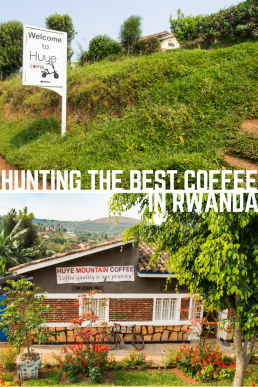
You May Also Like to Read:
The Strange Charm of the Bokor Hill Station in Cambodia
Bokor Hill Station in Cambodia has an intriguing history. It’s been a casino and a stronghold of Khmer Rouge. And locals say it’s haunted.
Canopy Trekking in Nyungwe Forest, Rwanda
Step on the Nyungwe Forest's Canopy Walkway to take a bird-eye on the wildlife and centuries old treetops.
When Reality Slaps You in the Face in the Genocide Memorial in Kigali, Rwanda
Getting a harsh reality check in the Kigali Genocide Memorial in Rwanda, where death and cruelty looked us straight in the eyes.


